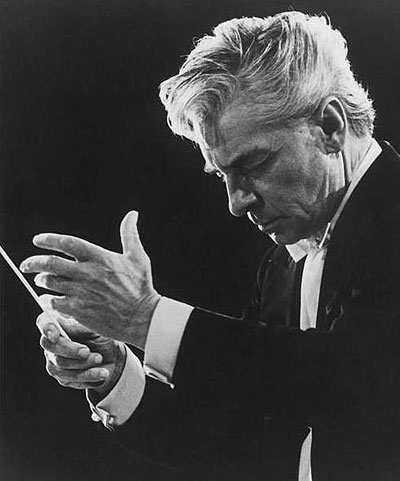|

Zhang Yinfan is a big classical music fan. This 18-year-old Xuhui Middle School student in Shanghai spends all his pocket money on recordings of ace conductor Herbert von Karajan. As a registered member of an online music fan club, Zhang often discusses Karajan's works with other members. This fervent von Karajan fan already has over 50 of his CDs.
This year marks the centenary of the Austrian-born conductor. For serious fans like Zhang, the artistic range and insights of Karajan's performances made him one of the greatest conductors of the 20th century. For millions more in China, his performances came to represent what a symphony concert is all about; more importantly, in China he was and will always be the "king of conductors" regardless of the criticism leveled against his performing style by some critics.
"I think his sensitivity is the core reason behind his high reputation worldwide," Zhang noted. "I learnt from other sources that he would be deeply moved simply by a hard-working cleaner; meanwhile, music lovers could feel a sense of stability through his conducting. In other words, he combined emotion and rationality to perfection."
Zhang's view is echoed by Han Xiaobo, a music commentator. "I think millions of fans here in China started on their journey into the classical music world because of Karajan, who was the first world-class conductor introduced to the Chinese audiences thirty years ago," said Han.
"Some young people preferred to spend more money on hi-fi equipment rather than daily necessities in the 1980s. This was because it was the fashion to enjoy classical music by collecting Karajan's recordings when the reform and opening up policy was just implemented nationwide," Han said.
"Unlike his counterparts, such as Wilhelm Furtwangler or Georg Solti, whose performances could either create perfect sound effects or a sense of the spiritual holy, Karajan was capable of turning music layman into fans, for he had a special gift for extracting beautiful sounds from an orchestra. He made Western classical music accessible and approachable for the Chinese audiences, which, in the long term, contributed to the promotion and popularity of classical music in the country," Han said.
Zhu Xiang, a software engineer working in Japan and fan of Karajan, believes classical music would be worse off if there were no Herbert von Karajans in the world. Nevertheless, Zhu is also aware of the fact that the general level of classical music appreciation in China is yet to improve despite the "Karajan fever."
"Since Karajan has been labeled a superstar conductor in the country, it seems to me that Chinese audiences prefer to woo top conductors rather than carefully analyze and appreciate works by other conductors," said Zhu.
The scenario is not as bleak as Zhu projects, because serious music lovers have grown in number in recent years. For example, fan club meetings usually reserve part of their time to discuss different versions of a symphony work played.
What do fans really think about Karajan? The answer, quoting from a Karajan online forum, is this: "He was wiping his tears away while conducting the Voices of Spring at the Vienna New Year's Concert in 1987. At that very moment, the whole world could see how deep his love for music was."
Biography of Herbert von Karajan
Born in Salzburg on April 5, 1908, Herbert von Karajan made his conducting debut in his hometown on January 22, 1929. In 1938, he began his long association with the Berlin Philharmonic, culminating with his appointment as Music Director for Life in 1956. In January 1980, he made the first digital recording of Mozart's The Magic Flute, and at the Salzburg Easter Festival on April 15, 1981, joined Polygram, Philips and Sony in introducing the "Compact Disc Digital Audio System" to the music world.
Altogether between 1955 and 1982, Karajan and the Berlin Philharmonic played 105 concerts in the United States. Other notable international tours included 11 visits to Japan -- the 1984 tour also took them to Korea -- and, in 1978, their first concerts in China. He was the recipient of many honors and awards, including the "Médaille de Vermeil" in Paris, the Gold Medal of the Royal Philharmonic Society in London, the Olympia Award of the Onassis Foundation in Athens and the UNESCO International Music Prize.
He died in Salzburg on July 16, 1989.
(Source: sonyclassical.com) | 